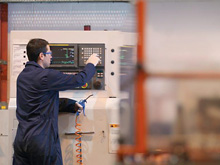HNC/HND Manufacturing Engineering

The HNC and HND Manufacturing Engineering awards have been designed to meet the educational requirements to work as a manufacturing incorporated engineer.
Use the tabs below to open each section individually. Alternatively you can show all the sections.
Who does this qualification suit
The HNC/HND Manufacturing Engineering awards have been designed to meet the educational requirements to work as a manufacturing incorporated engineer. They contain up-to-date and relevant manufacturing subject content and skills.
Access
As with all SQA qualifications, entry is at the discretion of the centre. Examples of formal entry qualifications include:
- One Higher from Physics, Technological Studies, Mechatronics or Mathematics and at least three National 5 passes including Mathematics, Physics/Technological Studies and English.
- A National Certificate in Engineering.
Employment and progression
HNC
The HNC will equip you with the skills required to seek employment in manufacturing, service and public sector organisations at engineering technician or incorporated engineer level.
With an HNC Manufacturing Engineering, you will normally be able to enter the first year of mechanical engineering (or related engineering) degree programmes.
HND
The HND will equip you with the skills required to seek employment in manufacturing, service and public sector organisations at engineering technician or senior engineer level.
With an HND Manufacturing Engineering you will normally be able to enter the second or third year of a degree programme, provided you have completed the Unit Mathematics for Engineering 3.
Both qualifications: HNC and HND
- provide a very solid platform for you to proceed to the advanced stages of a degree programme in Manufacturing Engineering. Ask your lecturer about progression arrangements your college has with any universities.
- partially satisfy the academic requirements to become an Incorporated Engineer (a degree is now required) and fully satisfy the requirements to be an Engineering Technician.
What you’ll learn
HNC and HND
You will have opportunities to learn and understand the core principles and technologies that underpin Manufacturing Engineering. This will be essential in providing you with a platform for tackling many manufacturing tasks and in allowing you to develop a more in-depth knowledge of Manufacturing Engineering.
You will develop sound, practical, manufacturing-based skills in investigation, construction, measurement, testing and project management that are critical to being a good manufacturing technician and/or incorporated engineer.
HNC only
There are opportunities to specialise in the following areas: Engineering Measurement, CNC, CAD, Design for Manufacture, Control Systems, Metal and Plastic Manufacture, Jigs and Fixtures, Industrial Systems, Statics and Strength of Materials, Information Technology Application Software, and Mathematics.
You will develop your skills in: planning, scheduling, investigation, construction, testing, evaluating, and reporting.
HND only
There are opportunities to specialise in the following areas: CNC, CAD, Computer Aided Engineering and Prototyping, Design for Manufacture, Control Systems, Jigs and Fixtures, Tool Design, Pneumatics and Hydraulics, Industrial Systems, Metal and Plastic Component Manufacture, PLC, Robotic Systems, Statics and Strength of Materials, and Mathematics.
You will develop your skills in: planning, scheduling, investigation, construction, testing, evaluating, and reporting.
Where can you take this course?
Group Award Specification
Qualification Verification Summary Reports
- 2015 Manufacturing Engineering (152 KB)
Related Information
- A guide to HNs (406 KB)
- HN Catalogue (2.03 MB)
- Changes to unit/group award and frameworks
- HN Annual Update (362 KB)
- Authenticating learners work good practice advice (123 KB)
- Updated conditions of assessment for HN Graded Units - August 2018 (49 KB)
